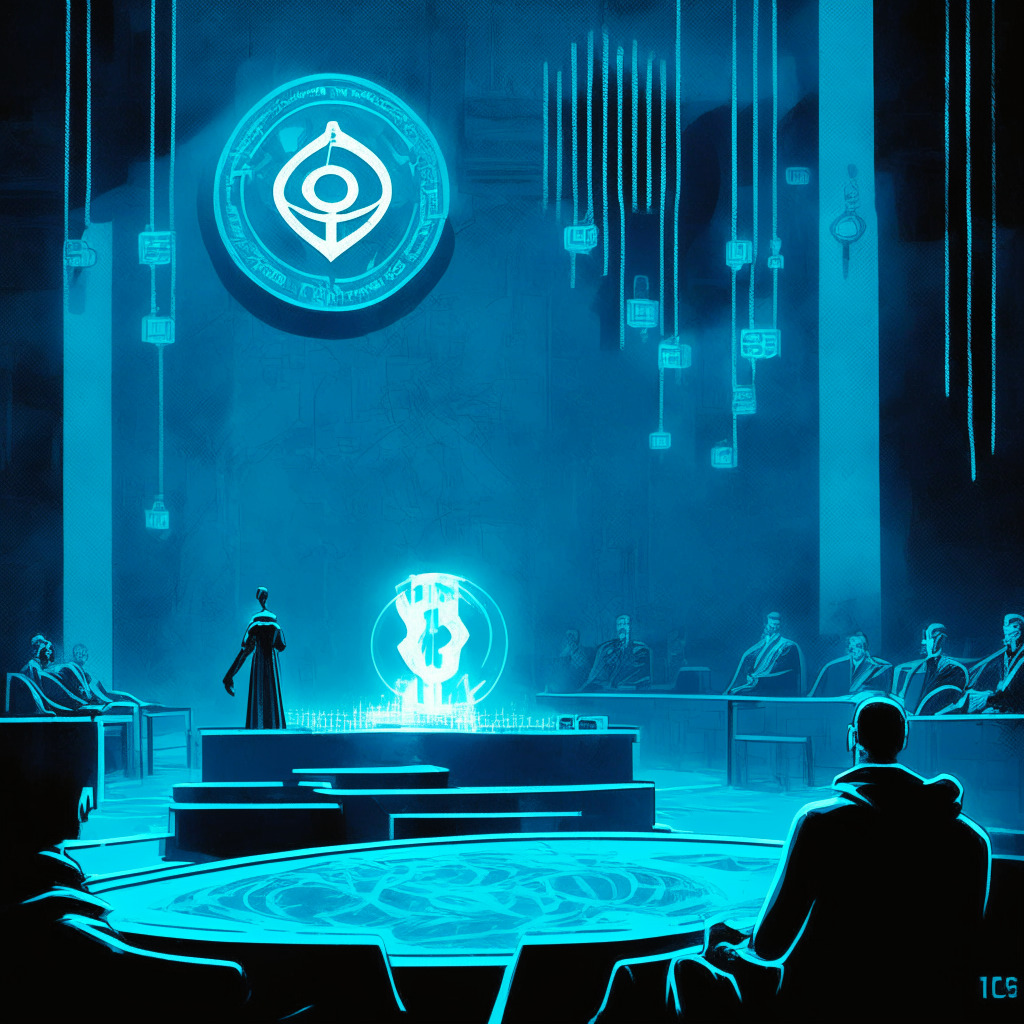The bankrupt crypto lender, Celsius Network, seeks to recover its properties from EquitiesFirst Holdings, following a failed collateral retrieval. Meanwhile, the Financial Accounting Standards Board approves the fair value of companies’ cryptocurrency holdings starting in 2025, generating mixed industry responses.
Search Results for: Alex
The Fall of Celsius: A Cautionary Tale of Blockchain Revolution and Its Risks
“Alex Mashinsky, ex-CEO of the defunct crypto lender, Celsius, faces federal court restrictions due to fraud allegations, including overselling Celsius’ financial health and indulging in risky trading practices. Legal action includes civil lawsuits and a potential $4.7 billion fine. The Celsius saga exemplifies the potential risks and rewards of the blockchain revolution.”
Bankrupt Crypto Lender versus Private Lending Platform: A Legal Wars Saga Unravels
“Bankrupt crypto lender, Celsius Network, has launched a complaint against EquitiesFirst Holdings, seeking to reclaim assets. Following claims EquitiesFirst held a $439 million debt backed by Celsius in cash and Bitcoin. This amidst Celsius’s tumultuous saga of collapsing market value, co-founder’s legal charges, and foggy future of asset buyout by potential bidders.”
Regulatory Turbulence in the Digital Seas: Navigating Through the Storms of Crypto Compliance
In the realm of digital assets, regulatory storms pose unprecedented challenges. From accusations against Tornado Cash co-founder, Roman Storm, to the turbulent experiences of former CEOs Alex Mashinsky and Sam Bankman-Fried; and Grayscale firm contesting SEC’s regulations, the unpredictable nature of this digital sea implores for a smart navigation strategy to avoid being swept into the unknown abyss.
Shifting Alliances in Crypto Winter: MakerDAO’s Migration and Ethereum’s Controversy
“In the midst of a crypto winter, the blockchain industry is innovating and adapting. Major shifts like MakerDAO’s potential move from Ethereum to Solana or Cosmos depict this change. Discussions suggesting Ethereum should have a “Supreme Court” for disputes also indicate this evolution. Amid technological advances, the volatile crypto world is reminded: “Money doesn’t materialize out of thin air.””
Tornado Cash Developer Under Scrutiny: A Ripple Effect Through the Crypto Universe?
Roman Storm, a primary developer for Tornado Cash, faces court proceeding against accusations of facilitating illicit activities including large-scale money laundering using their crypto platform. The case yields an imperative question: could coding for privacy-enabled blockchain technology become a punishable offense?
Frozen Assets in Cryptospace: A Dance between Innovation and Regulation
The US court has frozen former Celsius CEO, Alex Mashinsky’s assets amidst ongoing charges against him. This highlights increasing regulatory scrutiny in the crypto industry, raising concerns of stifling technological advancement while stressing accountability and consumer protection. The growing tension between innovation and regulation could potentially impact blockchain’s future.
Legal Struggles of Celsius Ex-Head Highlight Crypto’s Conflict with Traditional Law
“Ex-Celsius head Alex Mashinsky’s assets have been frozen due to a criminal lawsuit involving allegations of securities fraud related to the CEL token. Celsius’s creditors now face a major decision: potentially offload assets to regain access to their investments, underscoring the relentless battle between traditional legal infrastructure and the elusive crypto world.”
The Ethereum Supreme Court: A Radical Notion to Enhance Blockchain Safety and Stability
Matter Labs CEO, Alex Gluchowski, suggests the creation of an “Ethereum Supreme Court” to mediate disputes that could impact the Ethereum blockchain’s integrity. His proposed system aims to formalize Ethereum’s “social consensus layer” to safeguard platforms against exploitation, enabling community-engaged contract-based mediation in crisis scenarios.
Ethereum Supreme Court: A Solution for DeFi’s Contract Disputes or a Threat to Small Protocols?
Matter Labs CEO, Alex Gluchowski proposes an “Ethereum Supreme Court” for dealing with recurring smart contract disputes in DeFi. His vision involves a blockchain-based court system, similar to real-world judiciaries, to provide resolution for contract-related disagreements, particularly focusing on enhancing measures to handle unforeseen vulnerabilities and emergencies in Layer 2 implementations.
Decoding the ‘Ethereum Supreme Court’ Vision: Innovative Shield or Expensive Experiment?
Alex Gluchowski of Matter Labs proposes the formation of an ‘Ethereum Supreme Court’, an on-chain hierarchical court system working alongside current judicial structures to safeguard the Ethereum network against undue external interference. This system aims to handle various issues like disputes and emergency upgrades but its success depends largely on social consensus.
NFT God’s Recovery Journey: A Tale Of Theft, Vigilance and The Shift In Market Dynamics
Crypto personality, NFT God, managed to recover part of his digital assets, originally stolen in a hacking incident, thanks to Binance’s security team. The incident highlights both the risks within the digital marketplace and the ongoing need for enhanced cybersecurity vigilance for anyone involved in crypto and NFT trading.
Tornado Cash Indictments: Defining Moment for Crypto or Straightforward Crime?
The Tornado Cash indictments have raised concerns about the regulation of decentralized trading platforms. The co-founders are accused of enabling North Korea to launder crypto. However, these allegations point to monitoring fraudulent activities, not suppressing the industry. The focus is more on developer actions than setting a precedent for the entire cryptocurrency industry.
Crypto Slump: A Bearish Blip or the Dawn of a New Downward Trend?
Bitcoin slunk below the $26,000 mark with a lack of market catalysts ending the bearish trend. Other sizable tokens like XRP, Cardano’s ADA, and Solana’s SOL retraced by up to 2.2%. Trader Alex Kuptsikevich warns of a possible dip to the $23.9-24.6K region, resulting in a bearish forecast for Bitcoin. Future traders are preparing for a pessimistic market with potential further downside.
Bankruptcy Judge’s Hesitation on Crypto Tokens as Securities: A Case Study of Celsius
The bankruptcy judge recently declined to classify CEL, Celsius’s native token, as a security amid Ripple Labs and SEC’s ongoing legal issues. CEL’s business model significantly deviated, being referred to as “insolvent since inception” by a court-appointed examiner, who suggested CEL was part of a problematic scheme. The rising token value benefits the company but raises concerns about ethical considerations and customer implications.
Regulation Rollercoaster: CEL Token Status Still Unclear After Court Ruling
“In a surprising decision, Judge Martin Glenn dismissed a request to categorize CEL tokens as “not a security”. The request came about due to recent findings in the SEC vs Ripple case, however, this decision adds to the ongoing uncertainty on how cryptocurrencies are viewed under securities laws.”
The Fall of CEL Tokens: A Tale of Volatility, Valuation and Bankruptcy in Crypto Markets
The attempt to value CEL tokens at $0.80 met an unfortunate end, leading to a proposed wind-up plan at $0.25. Token holders’ plea about maintaining the original value endured the harsh reality of market manipulations. Amid the legal tussles and uncertainties, creditors have a month to cast their votes on the sale plan.
Cryptocurrency Coders in Legal Crosshairs: Who is Accountable for Blockchain Misuse?
“Roman Storm and Roman Semenov, coders of the Tornado Cash protocol, face U.S. legal proceedings, accused of aiding North Korea’s Lazarus Group with money laundering. This indictment raises questions on developer accountability, regulation standards, and the balance between potential national security risks and the right to financial independence and privacy in blockchain technology.”
Bitcoin Oversold: Technical Analysis Flags Market Trend and What it Means for Crypto Traders
According to a technical analysis, Bitcoin appears to be severely oversold, indicating a precipitous price drop. The 14-day relative strength index (RSI) is below 30, a situation unseen since the market crash in March 2020. Alex Kuptsikevich, a senior market analyst, confirms a shift to a bearish trend, advising not to misinterpret oversold RSIs as a bullish reversal signal.
Privacy vs. Transparency in Blockchain: A Look at Friend.tech’s Controversial Crypto Wallet Leak
“In the blockchain sector, privacy and security are essential. However, the release of a list of crypto wallet addresses connected to Friend.tech users on a GitHub repository stirred controversial discussion. The concern arises from the potential of viewing blockchain transactions linked to those wallets. As the blockchain technology continues to infiltrate social platforms, users should remain wary of the risks associated with data visibility.”
Yuga Labs Departs from OpenSea: Stand for NFT Creator Royalties Splits Community
“In response to OpenSea’s royalty model alterations and removal of the Operator Filter, Yuga Labs, behind the Bored Ape Yacht Club (BAYC), plans to phase-out OpenSea’s Seaport functionality by February 2024, reinforcing commitment to creator royalties.”
Bankruptcy Recuperation: Celsius Lender’s $2 Billion Asset Sale to Fahrenheit Group and its Implications for Crypto Market
Celsius’s bankruptcy proceedings may see it offloading assets to Fahrenheit Group following approval from a federal judge. The proposed scheme could see creditors receive a substantial $2 billion, with final disbursement expected before year-end, pending court’s decision in October. This restructuring has received support within the cryptocurrency community. The new entity’s speculative estimate is $500 million, with commitments to erect new mining facilities.
Plummeting Crypto Market: Causes, Upcoming Developments, and An Unpredictable Future
“The crypto market, led by Bitcoin’s 7% plunge, experiences significant sell-off, with $1 billion liquidations. Factors include variations in market structure and increasing liquidations. Meanwhile, creditors of insolvent Celsius may expect to recover 67%-85% of their holdings. U.S regulators may soon greenlight ether futures ETFs for final approval.”
Celsius Asset Sale: Bankruptcy, Scandal, and the Potent Future of Self-Regulated Crypto
In the saga of the troubled crypto lender, Celsius, a vote on the firm’s asset sale proposal to the Fahrenheit consortium is approaching. The court approval of the proposal indicates that creditors could recoup between 67% to 85% of their investments, amidst ongoing turbulence including former CEO, Alex Mashinsky’s contentious arrest, and a hefty FTC fine.
Shifting the Gaming Landscape: Immutable zkEVM and the Unpredictable World of Crypto
Immutable’s zkEVM, a Ethereum-compatible gaming platform developed with Polygon Labs, has begun public testing. This platform uses zero-knowledge proofs to secure transfers, decreasing development costs and enhancing security. However, Ethereum founder Vitalik Buterin warns it may cause data inefficiency and latency issues.
Battle of AI Chatbot Giants: Google BARD, ChatGPT and Ernie Impacting the Future of Web3 Development
“The AI market, strengthened by chatbots like Google BARD, ChatGPT, and Ernie, could be worth a staggering $267 billion by 2027. These platforms contribute different strengths to Web3 development; however, improvements are needed, particularly for Ernie, largely trained on Chinese data.”
NFTs and Art Collecting: Challenging the Conventional Paradigm with Mystery Artists
“Art collecting sees a shift with NFTs disrupting conventional paradigms and putting emphasis solely on art, not artists. Through blockchain technology, tokenized art is promoting unique speculative tendencies among collectors. Companies like Amazon Prime are also marking their entry into the NFT realm.”
Crypto Regulations Tighten: Mashinsky’s Trial and the Controversial Role of Stablecoins
Former Celsius CEO, Alex Mashinsky, is restricted in his financial operations and movement due to charges related to cryptocurrency fraud. Meanwhile, stablecoins are being discussed as a way to ensure US dollar’s global dominance, while critics warn of potential instability. The crypto and blockchain world continues to struggle for legitimacy and stability.
Bridging the Haven: Crypto’s Prospective Surge amidst Financial Instability
“Cryptocurrencies like XRP and Solana are leading a progressive momentum in trading. Crypto casino Rollbit plans to buy and incinerate its tokens, while Unibot experiences a rise due to positive social sentiment. Reddit-based moon tokens also record growth amid banking instability concerns. Notwithstanding, the unpredictability of crypto markets necessitates investor prudence.”
Belarus Takes Steps Toward Central Bank Digital Currency Amid Global Race
Belarus is following a digital revolution trend towards Central Bank Digital Currency (CBDC) initiatives, with preparations to launch a digital variant of the Belarusian ruble. This landmark project by the National Bank of the Republic of Belarus (NBRB) indicates potential for cross-border payments and compatibility with other global CBDCs.
Worldcoin’s Kenyan Controversy: Privacy versus Blockchain Innovation in Crypto Tech
“The recent police raid on Worldcoin’s Nairobi warehouse, in pursuit of collected data, has stirred controversy in Kenya. Concerns have been raised about potential privacy violations and misuse of sensitive iris data by Worldcoin’s project. This episode highlights how emerging crypto technologies are reshaping the discourse around privacy.”
Crypto Code Ethics Dilemma: Matter Labs Vs Polygon Zero and Shrinking Canadian Ownership
“The CEO of Matter Labs, Alex Gluchowski, denies accusations from Polygon Zero of copying code without proper attribution, asserting that their systems, Plonky2 and Boojum, are implementations of RedShift, introduced by Matter Labs three years prior.”































